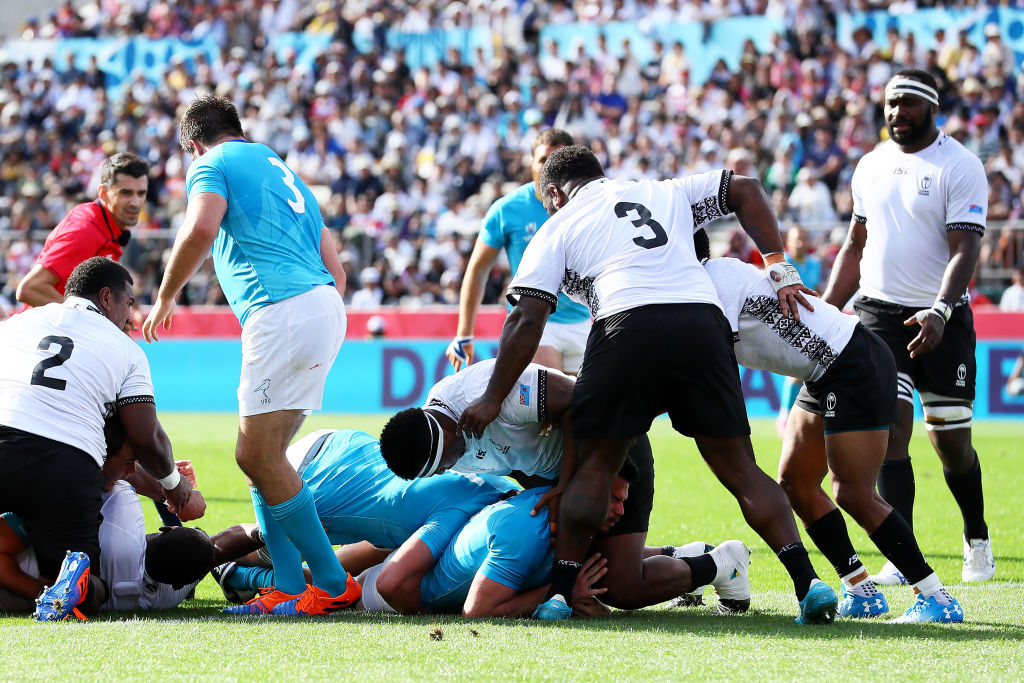
Nobody following the World Cup beyond the banks of the River Plate in Montevideo would have heard of a back row forward called Diana before last Wednesday.
For those tracking events in Japan from the Uruguayan capital, his mere presence beside the Pacific Ocean in a city destroyed by the tsunami of 2011 provided ample reason for tears. Manuel Diana personifies the indestructible spirit of a rugby club like no other, Old Christians.
By the time the giant-killers finished their afternoon’s work against Fiji in Kamaishi, Los Teros had knocked the tenth ranked team clean out of the tournament. In doing so they demonstrated their country’s ability to leave a mark on the world stage other than the one caused by Luis Suarez and his gnashers.
Diana decorated his contribution by scoring the second of Uruguay’s three tries. Another Old Christian, Tomas Inciarte, appeared off the bench as the substitute scrum-half before the captain, Juan Manuel Gaminara, rose magnificently to the occasion after the match as he had during it.
He wiped away his tears and spoke of his confreres and of his country but, most strikingly of all, he paid homage to his hosts and what they had endured since the earthquake that cost more than 1,200 lives. “It was a privilege to play here,” he said addressing the crowd in Kamaishi. “Thankyou.”
Old Christian former players would have been less than human had they not wept, especially those with long memories like Gustavo Zerbino and Roberto Canessa. They were both 19-year-old medical students when their club chartered a plane for a match in Santiago.
Uruguayan Air Force flight 571 from Montevideo never reached the Chilean capital. On Friday the 13th of October 47 years ago it crashed in the Andes with Zerbino and Canessa two of 45 passengers.
Twenty nine were killed, some who lived through the crash only to be swept to their deaths by an avalanche of snow. Miraculously five of the team survived for 72 days at an altitude of more than a thousand feet in temperatures as low as minus 30 Centigrade.

The rescue teams who found them had long given up hope of how any could have still been alive. They did so by eating the flesh of team mates killed in the crash and some 20 years later Hollywood turned their survival into a blockbuster of a movie, Alive!
Zerbino resumed where he had left off, on the left wing for Old Christians. He became an international in his own right, a feat emulated by his brother Jorge, Uruguay’s captain for 12 years.
A past president of Uruguayan rugby, Zerbino was there in Galashiels 20 years ago when Diego Ormachea’s team won their first match at their first World Cup, against Spain. And he was there in Cardiff in 2015 when his nephew, Jorge, maintained the family tradition on the global stage, against Wales.
Gustavo told me then how not a day passed without his remembering those who perished in the crash and the ensuing avalanche. “I must keep faith with those brave friends who kept us alive,” he said.
Uruguay have come a long way since conceding nine tries and 60 points to England at Manchester City’s Etihad Stadium in what was Stuart Lancaster’s last match as head coach before he paid the price for failing to reach the quarter-finals four years ago.
Last Wednesday they did the tournament a massive favour, giving it a rare act of giant-killing, a welcome diversion from the monotony of foregone conclusions. In Montevideo the banner headline in El Pais said it all: “Los Teros Shock The World.”
They did so with a 23-man squad which included Diego Ormachea’s two sons, Agustin and Juan who plays for Mont-de-Marsan. While some play in North America for clubs like Houston Sabercats, New Orleans Gold and Toronto Arrows, one, Santiago Civetta, spends his winters at Darlington Mowden Park.
How reassuring that an increasingly professional world can still find room for a few from an amateur club like Old Christians, winners of 18 Primera Division titles since Zerbino, Canessa and three others passed the ultimate survival test on a mountainside almost half a century ago.






























You must be logged in to post a comment Login